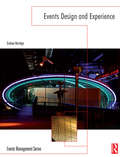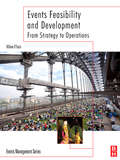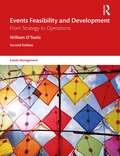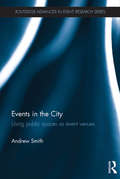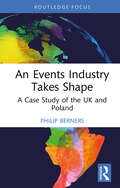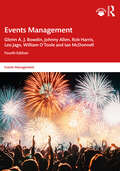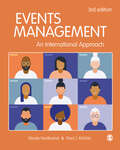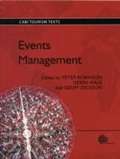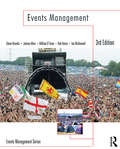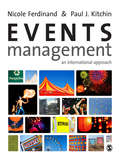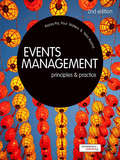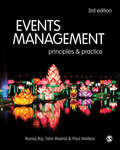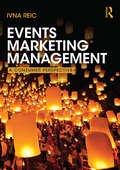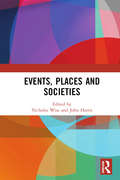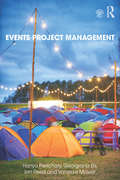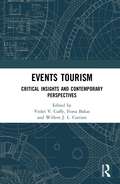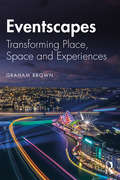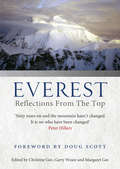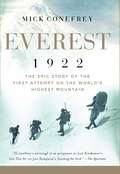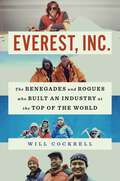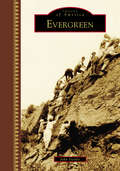- Table View
- List View
Events Design and Experience (Events Management)
by Graham BerridgeFor the first time Events Design and Experience draws together the relationship between event design and the experience of consumers and participants. It explores and analyses the event experience of the individual and how this can be ‘controlled’ by design.By drawing upon ongoing research conducted over several years into the experiences of groups and individuals who attend events this text will ask questions such as: What was the rationale behind a particular event being designed in a certain way? What was the actual experience of consumers? How was the event materially delivered and did the experience created provide a satisfactory outcome? How can experiences be understood (via semiotics) especially the physical elements of an event?Structured in four sections, Events Design and Experience discusses:* What are events? An overall view of the industry, its definitions and market demand. It also covers an analysis of previous literature, and draws upon real life events such as Wembley plc, Leapfrog Corporate events and the British Cycling federation* What is an event experience? An explanation of the nature and stages of experience, and the emergence of the experience industry itself. Cases such as the Proms, London Fashion week ands the Nike Fun run are used to illustrate.* Designing Experiences. Considers how design itself can impact upon the experience, in some cases fundamentally changing the nature of experience. It asks the question of how experiences are designed and what do they signify to the customer once complete.* Analysing Event Experiences. Considers how experiences can be analysed and evaluated looking at the artificiality of the event and how this reflects in the experience of consumers. Also includes a review of the psychological processes of perception and interpretation and how meaning and experience can be analysed, and how we may begin to unravel the meanings attributed to certain events. With international case studies throughout, Events Design and Experience has a coherent user-friendly structure including chapter summaries, review exercises and topics for discussion to consolidate understanding.
Events Feasibility and Development (Events Management)
by William O'TooleEvents Feasibility and Development: From Strategy to Operations answers two fundamental questions faced by all events planners and organizers: how do I justify this event to the client? and why are we spending money on this event?. With a user-friendly learning structure containing bullet points, questions and exercises and international case studies (Australian Taxation Office, Saudi Arabian events returns, Fuji-Xerox events), Events Feasibility and Development: From Strategy to Operations looks at issues such as: the process of creating a feasibility study events forecasting models and cost/benefit analysis types of events (exhibitions, sports, festivals) and their benefits and returns project management tools for measuring return on investment. Companion website: www.eventsfd.com -- contains videos, colour photos and a list of related resources.
Events Feasibility and Development: From Strategy to Operations (Events Management)
by William O'TooleEvents Feasibility and Development: From Strategy to Operations 2nd Edition outlines the best practice in event development and the global events sector. Tools and techniques from the first edition have been refined and expanded through their use in over 20 countries, including the USA, France, UAE, Malaysia and South Africa. These include strategy development and implementation, asset management, portfolio management, return on investment, management process mapping and the feasibility study. Fascinating current examples illustrate these professional management techniques. The second edition elaborates on the events sector maturity model as a measurement tool for cities, regions and countries. This has been tried and successfully tested in developing economies and assisted in the rapid development and sustainability of events in Dubai and many other destinations. Each chapter contains exhibits, questions, bullet points and clear explanations of the tools and techniques. Brand new material includes: A full explanation of the maturity model including post-pandemic solutions New case studies and exhibits A new section on teaching and training in event management The chapters are fully supported by further current case studies and examples on the publisher’s and the author’s website. Online material also includes 11 lesson plans for a semester course, containing assessment items, learning objectives and teaching tips for each topic, and event photos and author videos explaining the topics. This will be essential reading for all students of Event Management.
Events in the City: Using public spaces as event venues (Routledge Advances in Event Research Series)
by Andrew SmithCities are staging more events than ever. Within this macro-trend, there is another less acknowledged trend: more events are being staged in public spaces. Some events have always been staged in parks, streets and squares, but in recent years organisers have tried to bring events out of traditional venues and into prominent urban spaces. This is favoured by organisers seeking more memorable and more spectacular events, but also by authorities who want to animate urban space and make it more visible. This book will explore, account for and illustrate these trends. Most importantly, it will outline their implications. Whilst most accounts of events assume they play a positive role in our cities, the use of public spaces for events is controversial. Events can denigrate as well as animate public space. They can be seen as part of the commercialisation, privatisation and (over)regulation of public space noted by commentators in recent years. This innovative text offers significant insight into some of the key reasons why cities are staging more events in public spaces (the need to generate funds and market cities), what problems this causes (exclusion, commercialisation, disruption) and how effective management and regulation can help to secure more optimal outcomes for citizens. This topical and timely volume is valuable reading for higher level students, researchers and academics from Events, Urban Studies and Development studies.
An Events Industry Takes Shape: A Case Study of the UK and Poland
by Philip BernersThis timely book critically evaluates the factors which shape an events industry as it develops, with the aim of helping to narrow the disparate behaviours and practices of organisers within the global marketplace of international events.Stemming from an innovative qualitative research project, which included interviews with senior events organisers at landmark venues in both the UK and Poland, this volume provides an insight into both the emerging events industry in Poland and the developed events industry in the UK, highlighting cross-cultural risk and safety gaps that may impact organisers, clients, attendees, suppliers, and workers. The book highlights the importance of a unanimous global approach to events organisation, the creation of a professional community of practice, and ethos of self-learning within the events industry and the need for an international professional association for organisers involved with providing international events. The book explores the three themes of 'Event Culture', 'Tourism and Events', and 'Risk Awareness at Events', thus focusing on long-term factors of events industries.International in scope, this book will appeal to students on courses such as managing events, planning events, project management, and hospitality and tourism studies, as well as events organisers in locations where events is an emerging industry.
Events Management (Events Management)
by Glenn A. Bowdin Johnny Allen Rob Harris Leo Jago William O'Toole Ian McDonnellA must-have introductory text of unrivalled coverage and depth focusing on events planning and management, the fourth edition of Events Management provides a complete A to Z of the principles and practices of planning, managing and staging events. The book offers a systematic guide to organising successful events, examining areas such as event design, logistics, marketing, human resource management, financial planning, risk management, impacts, evaluation and reporting. The fourth edition has been fully updated and revised to include content covering technology, including virtual and hybrid events, concepts such as social capital, soft power and events, social inclusion, equality, accessibility and diversity, and the latest industry reports, research and legal frameworks. The book is logically structured and features new case studies, showing real-life applications and highlighting issues with planning events of all types and scales in a range of geographical locations. This book has been dubbed ‘the events management bible’ and fosters an interactive learning experience amongst scholars of events management, tourism and hospitality.
Events Management: An International Approach
by Nicole Ferdinand Paul J. KitchinTaking an explicit international approach to the subject, Events Management combines theory and practice to address the challenges and opportunities of working in a global world to help prepare students for the realities of the events management sector. Written by a high profile international team of editors and contributors, the text features cases spanning Europe, Africa, Asia, Australia and North America, and covers key topics and issues such as fundraising, sponsorship, globalization and sustainability. It also aims to bolster student employability through the inclusion of features such as practical asides and case studies to give students a window into the real life of a practitioner. Brand new to the third edition: - An in-depth examination of the implications of Covid-19 for international events, including sponsorship arrangements, risk management and future job prospects for events management graduates - Two brand new chapters covering developments in digital marketing and accessible events management - Case studies featuring India, Australia, Peru, Europe, UK and USA and covering events such as music festivals, Holi, Mardi Gras as well as mega events such as the Olympics - Updated theory about the critical global issues affecting events and the main drivers of change in the industry - A companion website featuring links to interactive learning resources, an Instructors manual for lecturers, events-related videos for fun additional educational viewing, and author-selected SAGE journal articles for advanced learning. Suitable for courses in Events Management and International Events Management.
Events Management: An International Approach
by Nicole Ferdinand Paul J. KitchinTaking an explicit international approach to the subject, Events Management combines theory and practice to address the challenges and opportunities of working in a global world to help prepare students for the realities of the events management sector. Written by a high profile international team of editors and contributors, the text features cases spanning Europe, Africa, Asia, Australia and North America, and covers key topics and issues such as fundraising, sponsorship, globalization and sustainability. It also aims to bolster student employability through the inclusion of features such as practical asides and case studies to give students a window into the real life of a practitioner. Brand new to the third edition: - An in-depth examination of the implications of Covid-19 for international events, including sponsorship arrangements, risk management and future job prospects for events management graduates - Two brand new chapters covering developments in digital marketing and accessible events management - Case studies featuring India, Australia, Peru, Europe, UK and USA and covering events such as music festivals, Holi, Mardi Gras as well as mega events such as the Olympics - Updated theory about the critical global issues affecting events and the main drivers of change in the industry - A companion website featuring links to interactive learning resources, an Instructors manual for lecturers, events-related videos for fun additional educational viewing, and author-selected SAGE journal articles for advanced learning. Suitable for courses in Events Management and International Events Management.
Events Management
by Steve Gelder Caroline Wiscombe Ade Oriade Sine Heitmann Peter Robinson Andrew Ridal Crispin Dale Christine Roberts Ghislaine Povey Geoff Dickson Debra WaleEvent management studies are fast growing in popularity, covering a diverse range of activities such as music and film festivals, concerts, sporting events and conferences. This textbook gives a broad and practical coverage of the major themes in events. Outlining both the historical developments and current state of the industry, whilst also taking into account wider political and cultural issues, the book covers the different elements of planning, project management, health and safety, funding, operations, human resources, marketing and logistics that are vital for successful management. Critical issues such as impacts, sustainability and legacy of events are also discussed. Supported by international case studies and review questions, Events Management provides a current and up-to-date view of the industry in this field.
Events Management (Events Management)
by Rob Harris Ian McDonnell William O'Toole Glenn Bowdin Johnny AllenEvents Management is the must-have introductory text providing a complete A-Z of the principles and practices of planning, managing and staging events. The book: introduces the concepts of event planning and management presents the study of events management within an academic environment discusses the key components for staging an event, covering the whole process from creation to evaluation examines the events industry within its broader business context, covering impacts and event tourism provides an effective guide for producers of events contains learning objectives and review questions to consolidate learning Each chapter features a real-life case study to illustrate key concepts and place theory in a practical context, as well as preparing students to tackle any challenges they may face in managing events. Examples include the Beijing Olympic Games, Google Zeitgeist Conference, International Confex, Edinburgh International Festival, Ideal Home Show and Glastonbury Festival. Carefully constructed to maximise learning, the text provides the reader with: a systematic guide to organizing successful events, examining areas such as staging, logistics, marketing, human resource management, control and budgeting, risk management, impacts, evaluation and reporting fully revised and updated content including new chapters on sustainable development and events, perspectives on events, and expanded content on marketing, legal issues, risk and health and safety management a companion website: www.elsevierdirect.com/9781856178181 with additional materials and links to websites and other resources for both students and lecturers
Events Management
by Mr Paul James Kitchin Ms Nicole FerdinandWritten by a team of twenty-five high profile, international authors, this exciting new text successfully combines theory and practice, making it a must-have for all students of Events Management.<P><P> Events Management: An International Approach provides comprehensive coverage of all the most common types of events, preparing students for a future career in Events Management. Covering key issues such as fundraising, sponsorship, globalization and sustainability, this text addresses the challenges and examines the realities of events management in an international context. A wide range of case studies and examples look at sporting, music, catering and fundraising events across Europe, Africa, Asia, Australia and North America.<P> Key features include:<P> * An international approach, drawing on a wide range of cases from around the world<P> * Extensive pedagogical features such as Diary of an Event Manager and Exercises in Critical Thinking<P> * A companion website offering a full Instructor's Manual, PowerPoint slides, additional case studies and links to SAGE journal articles<P> This book is essential reading for all undergraduate and postgraduate students studying Events Management. <P> Visit the Companion Website at www.sagepub.co.uk/ferdinand <P> Nicole Ferdinand is Senior Lecturer in Events Management at the London Metropolitan Business School.<P> Paul J. Kitchin is Lecturer in Sports Management at the University of Ulster.
Events Management: Principles and Practice
by Razaq Raj Paul Walters Mr Tahir RashidThe new edition of this popular accessible text gives students a thorough and contemporary grounding in both the fundamentals and strategic responsibilities of successful event management. Purposefully broad in scope, the text combines theory with practical knowledge and terminology, ensuring readers develop a flexible and commercially-acute skill set. <P><P> Topics covered range from law, marketing and finance to introductory guides to sound, lighting and multimedia equipment, providing students with the practical knowledge they need for a career in Events Management. Theory is brought to life in a range of case studies and examples throughout the text. <P> As well as updated examples and legislation, this edition introduces new chapters on:<P> * Event entrepreneurship<P> * Project management and financing<P> * New Multimedia technology for events organisers<P> * Sustainable festivals and events<P> * Long term legacy and impacts<P> * The future of the industry<P> An accompanying Companion Website provides students with discussion questions and video links. The website also provides an Instructor's Manual and PowerPoint slides for lecturers. <P> This text is an ideal resource for undergraduate students who are studying Events Management for the first time. <P> Visit the Companion Website at www.sagepub.co.uk/raj
Events Management: Principles and Practice
by Razaq Raj Paul Walters Tahir RashidEvents Management provides an introductory overview of the fundamentals in managing events from conception to delivery, highlighting both the theoretical and operational aspects, to prepare students for a career in events management and hospitality. Now in its Third Edition, the authors have included new chapters on Crowd Control and Crowd Dynamic; Expos, Conferences and Conventions; Brand Co-creation and Social Media, and have added new content on contemporary trends like the environmental and social impact of large scale events such as the Olympics. International case studies covering all manner of events are used throughout and include: · The impact of the London 2012 and Rio 2016 Olympic Games · Van Gogh Augmented Reality in Nuenen · Sands EXPO and Convention Center, Las Vegas · Glastonbury Music Festival · Lame Horse Night Club, Russia · The Leeds Caribbean Festival PowerPoint slides and an Instructor Manual can be found online. Suitable for Events Management students at Undergraduate and Postgraduate level.
Events Management: Principles and Practice
by Razaq Raj Paul Walters Tahir RashidEvents Management provides an introductory overview of the fundamentals in managing events from conception to delivery, highlighting both the theoretical and operational aspects, to prepare students for a career in events management and hospitality. Now in its Third Edition, the authors have included new chapters on Crowd Control and Crowd Dynamic; Expos, Conferences and Conventions; Brand Co-creation and Social Media, and have added new content on contemporary trends like the environmental and social impact of large scale events such as the Olympics. International case studies covering all manner of events are used throughout and include: · The impact of the London 2012 and Rio 2016 Olympic Games · Van Gogh Augmented Reality in Nuenen · Sands EXPO and Convention Center, Las Vegas · Glastonbury Music Festival · Lame Horse Night Club, Russia · The Leeds Caribbean Festival PowerPoint slides and an Instructor Manual can be found online. Suitable for Events Management students at Undergraduate and Postgraduate level.
Events Marketing Management: A consumer perspective
by Ivna ReicThis textbook provides students with an essential introduction to the theoretical underpinnings and practicalities of managing the marketing of events. In order to market events effectively, it is vital to consider marketing of events from the organiser’s perspective and to link it to that of the consumers attending events. As such, this is the first book on the topic which reflects the unique characteristics of marketing in the Events industry by exploring both sides of the marketing coin – the supply and the demand – in the specific context of events. The book takes the reader from core marketing mix principles to exploring the event marketing landscape to consumer experience and involvement with event marketing and finally strategies and tactics employed to manage the marketing activities related to events. The use of technology, importance of sponsorship and PR are also considered. International case studies are integrated throughout to show practical realities of marketing and managing events and a range of useful learning aids are incorporated to aid navigation throughout the book, spur critical thinking and further students’ knowledge. This accessible and comprehensive account of Events Marketing and Management is essential reading for all students and future managers.
Events, Places and Societies
by Nicholas Wise John HarrisEvents can be synonymous with a particular place, helping shape and promote a location. Given the rise of the global events industry, this book uncovers how events impact upon places and societies, looking at a range of different events and geographical scales. Geographers are concerned with how notions of space and place impact people, communities and identity, and events have played a central role in how places are perceived, consumed and even contested. This book will discuss international event cases to frame knowledge around the increased demands, pressures and complexities that globalisation, transnationalism, regeneration and competitiveness has put on events, places and societies. Integrating discussions of theory and practice, this book will explore the range of conceptual perspectives linked to how geographers and sociologists understand events and the role events play in contemporary times. This involves recognizing histories and planning strategies, the purpose of bidding for an event or the local meanings that have emerged and changed in the place. This helps us analyse how events have the potential to redefine place identities. This international edited collection will appeal to academics across disciplines such as geography, planning and sociology, as well as students on events management and events studies courses.
Events Project Management
by Hanya Pielichaty Georgiana Els Ian Reed Vanessa MawerThis book provides events management students with an accessible and essential introduction to project management. Written by both academics and industry experts, Events Project Management offers a unique blend of theory and practice to encourage and contextualise project management requirements within events settings. Key questions include: What is project management? How does it connect to events management? What is effective project management within the events sector? How does academic theory connect to practice? The book is coherently structured into 12 chapters covering crucial event management topics such as stakeholders, supply chain management, project management tools and techniques, and financial and legal issues. Guides, templates, case study examples, industry tips and activity tasks are integrated in the text and online to show practice and aid knowledge. Written in an engaging style, this text offers the reader a thorough understanding of how to successfully project manage an event from the creative idea to the concrete product. It is essential reading for all events management students.
Events, Society and Sustainability: Critical and Contemporary Approaches (Routledge Advances in Event Research Series)
by Tomas Pernecky Michael LückThe growth of the events industry brings with it concerns of sustainable management, the sharing of available resources, and ensuring that people and places are not over-exploited. While the environmental and economic dimensions of sustainability have attracted a reasonable attention in the study of events, the social and cultural aspects of sustainability have been largely neglected. This book brings together emerging critical perspectives, innovative conceptual frameworks and contemporary case studies. Events cannot be isolated from the actions of humans and this is reflected in the emphasis on people and society throughout. The next wave of sustainable discourse requires a critical synthesis of information and this book is the first to address the need for more critical approaches and a broader way of thinking about events and sustainability. Divided into five thematic parts, the contributions delve into understanding the mainstream stances towards sustainability, the role events play in indigenous cultures and in diasporic communities, and the extent to which events influence the public discourse and civic identity. Sustainability is also examined from a strategic perspective in the events sector, and consideration is given to issues such as corporate social responsibility, greenwashing, and the power of mulit-stakeholder alliances in promoting sustainability goals. Written by leading academics, this timely and important volume will be valuable reading for all students, researchers and academics interested in Events and the global issue of Sustainability.
Events Tourism: Critical Insights and Contemporary Perspectives (Routledge Critical Event Studies Research Series.)
by Violet V. Cuffy; Fiona Bakas; and Willem J. L. CoetzeeThis book presents critical insights and contemporary perspectives for exploring current trends, concerns and prospects of events tourism. It examines modern-day global issues facing the events and tourism industry, policymakers, researchers and academics to advance understanding of practice and development of theory. Organised in four parts, this book examines how events tourism is designed, planned and delivered. The first part engages with the core, fundamental concepts of events tourism which establish a basic understanding of the field. The second part addresses contemporary issues related to visitor attractions, music festivals, small and user-generated events, wanderlust and entrepreneurship. The third part focuses on meetings and challenges in the conference industry after disasters, the economic impact and other dilemmas of mega-events, and city and destination concerns. The fourth and final part provides a peek into the future of events tourism vis-à-vis reshaping cities, music festivals and critical dilemmas of the 21st century. With an international appeal because of cross-national contributions, this book will interest events and tourism practitioners, academics, students, researchers, policymakers, and business and investment sector professionals across the globe.
Eventscapes: Transforming Place, Space and Experiences
by Graham BrownEventscapes: Transforming Place, Space and Experiences directly examines the interrelation between events’ simultaneous dependence on and transformation of the places in which they are held. This event–environment nexus is analysed through a variety of international case studies including different kinds of well-known sporting and cultural events such as Vivid Sydney, the Vancouver 2010 Winter Olympics and the Tour Down Under international cycle race, among others. Chapters focusing on visual design explore the opportunities, at different spatial scales, to develop an event ‘look’ and the ways in which an event experience can be enhanced through connecting and engaging with the local culture and community. As well as the planning and management of events, the book draws on event experience, dramaturgically examining the roles played by authors, actors and the audience, and emphasises the participation of multiple groups in the co-creation of event experiences. This will be invaluable reading for those studying events and the environment. Adopting a multidisciplinary approach, it also draws on geography, urban and cultural studies, image studies, architecture and design, environmental psychology, and event management, and will be of use to a broad academic audience.
Everest: Reflections From The Top
by Christine Gee Garry Weare Margaret GeeOn 29 May 1953, Edmund Hillary and Tenzing Norgay were the first ever to set foot on the highest point on earth: the summit of Everest. It was a magical moment. Since then many men and women have striven to reach the top of this awesome mountain, which can be at once beautiful and mystical, unpredictable and highly dangerous, never straightforward and always incredibly tough. In this timely and remarkable book, published to celebrate the sixtieth anniversary of the original ascent, mountaineers from all round the world tell what motivated them to make their own summit bids. They highlight how it felt to reach the top and the impact it made on them, ranging from practical comments to spiritual reflections, to philosophical statements on the future of our planet, including contributions from climbers such as: Chris Bonington, Alan Hinkes, Eric Simonson, Reinhold Messner, Jamling Tenzing Norgay, Bear Grylls, Greg Mortimer, Junko Tabei, Peter Hillary, Doug Scott and Stephen Venables. Not only is this a fascinating and insightful collection to mark more than half a century of the highest adventure, it is also an inspiration to any one of us when we contemplate heroic achievements of our own - whatever they may be.
Everest 1922: The Epic Story of the First Attempt on the World's Highest Mountain
by Mick ConefreyThe dramatic and inspiring account of the very first attempt to climb Mount Everest, published to coincide with the centenary of the expedition of 1922.The first attempt on Everest in 1922 by George Leigh Mallory and a British team is an extraordinary story full of controversy, drama, and incident, populated by a set of larger-than-life characters straight out of an adventure novel. The expedition ended in tragedy when, on their third bid for the top, Mallory's party was hit by an avalanche that left seven men dead. Using diaries, letters, and unpublished accounts, Mick Conefrey creates a rich, character-driven narrative that explores the motivations and private dramas of the key individuals—detailing their backroom politics and bitter rivalries—who masterminded this epic adventure.
Everest, Inc.: The Renegades and Rogues Who Built an Industry at the Top of the World
by Will CockrellFeaturing original interviews with mountain guides and climbers—including Jimmy Chin and Conrad Anker—this vivid and authoritative adventure history chronicles one of the least likely industries on Earth: guided climbing on Mount Everest.Anyone who has read Jon Krakauer&’s Into Thin Air or has seen a recent photo of climbers standing in line to get to the top of Everest may think they have the mountain pretty well figured out. It&’s an extreme landscape where bad weather and incredible altitude can occasionally kill, but more so an overcrowded, trashed-out recreation destination where rich clients pad their egos—and social media feeds—while exploiting local Sherpas. There&’s some truth to these clichés, but they&’re a sliver of the story. Unlike any book to date, Everest, Inc. gets to the heart of the mountain through the definitive story of its greatest invention: the Himalayan guiding industry. It all began in the 1980s with a few boot-strapping entrepreneurs who paired raw courage and naked ambition with a new style of expedition planning. Many of them are still living and climbing today, and as a result of their astonishing success, ninety percent of the people now on Everest are clients or employees of guided expeditions. Studded with quotes from original interviews with more than a hundred western and Sherpa climbers, clients, writers, filmmakers, and even a Hollywood actor, Everest, Inc. foregrounds the voices of the people who have made the mountain what it is today. And while there is plenty of high-altitude drama in unpacking the last forty years of Everest tragedy and triumph, it ultimately transcends stereotypes and tells the uplifting counternarrative of the army of journeymen and women who have made people&’s dreams come true, and of the Nepalis who are pushing the industry into the future.
Everglades Wildguide
by Jean Craighead GeorgeHere is the story of the plants and animals of the Everglades, this country’s subtropical kingdom. Plants and animals found nowhere else in the 50 states are found here in abundance, though in an increasingly perilous state. In this handbook, first published in 1972, author and researcher Jean Craighead George brings to the telling of this story long years of study and understanding. Checklists and glossaries at the back buttress her account of the natural history of this national park.
Evergreen (Images of America)
by John SteinleEarly settlers were drawn to the Evergreen area for its unsurpassed beauty and natural resources. Ranching and lumber were the initial basis for Evergreen�s economy in the 1800s, and wealthy summer residents built prestigious second homes there. By 1920, Evergreen became a tourist mecca through development of the Denver Mountain Parks system and famed hotels, resorts, and dude ranches. From 1920 to 1942, Evergreen was the epicenter of outdoor recreation in Colorado. After World War II, a unique array of volunteer arts, nature, and charity organizations was created by Evergreen�s people. A bohemian era in the 1960s and 1970s brought artists, musicians, and hippies, including Willie Nelson, to Evergreen. Explosive growth after completion of Interstate 70 led to development of new festivals and attractions, including the magnificent parks of the Jefferson County Open Space system. Evergreen still retains an atmosphere of the legendary Old West, from its boardwalk along Main Street to its annual Evergreen Rodeo and Rodeo Parade to its surviving area ranches.
